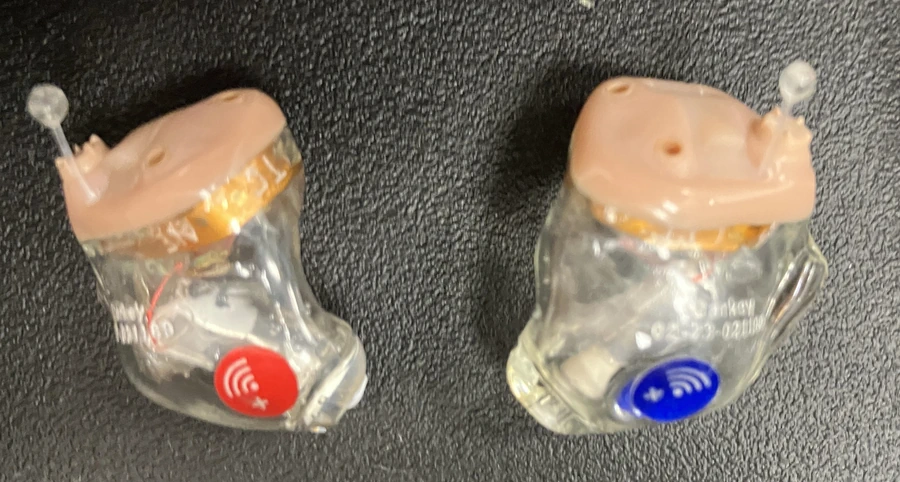Promoting Quality of Life through Improved Hearing Care
Tips for Hearing Aid Care in Nursing Homes or Assisted Living.

- Label the Hearing Aids: Use bold, easy-to-read labels to prevent mix-ups for all hearing aid supplies. When hearing aids are ordered by the audiologist, ask the aids to be ordered with engraving the patient’s last name on the shell of the hearing aid.
- Pick the Correct Hearing Aid: See my recommendation for the best hearing aids for seniors.
- Establish Nighttime Storage: Provide a designated storage area to protect hearing aids from damage or loss during sleep, this can be the hearing aid charger or a hearing aid case. The resident should know where to place the hearing aids, and also educate staff about the location.
- Consider a Cord and Clip: This accessory can secure hearing aids and prevent accidental misplacement. Especially with memory care residents, a retention cord can be the answer to hearing aids getting lost.
- Explore Safety Products for Hearing Loss at the Nursing Home: These include doorbell signalers, vibrating alarm clocks, or flashing smoke detectors if the building does not have these consider purchasing them.
- Face Masks and Hearing Aids: Facemasks are a leading cause of hearing aids being lost. Be careful when pulling off a facemask.
- Regular Maintenance: Regularly clean and check hearing aids for debris, earwax buildup, and proper functioning. Many residents can not do this on their own. It is best if a family member replaces wax traps every 2-4 weeks, if family support is not available, train nursing staff.
Communication with Nursing Home Staff About Hearing Aids
- Schedule a Meeting: Arrange a meeting with the nursing home staff to discuss your loved one’s hearing aid needs and any specific accommodations required. Can the patient insert hearing aids on their own or do they need assistance, what is expected of the staff.
- Provide Educational Materials: Share informative resources about hearing aids, maintenance tips, and communication strategies with the nursing home staff.
- Encourage Staff Training: Advocate for training programs or workshops that educate nursing home staff on hearing aid use, care, and communication techniques.
Strategies to Promote Effective Hearing Care for Loved Ones
To maintain the quality of life of nursing home residents, their auditory health should be prioritized. Here are some comprehensive strategies to help you advocate for your loved one’s hearing needs:
- Promote Regular Hearing Assessments: Annual hearing tests are pivotal in identifying any shifts in the auditory capabilities of nursing home residents. By arranging regular hearing check-ups and quarterly hearing aid cleanings, you can swiftly address any hearing loss issues.
- Coordinate with nursing home staff for periodic auditory health assessments.
- Stress the value of early intervention and timely hearing aid fitting to healthcare professionals.
- Push for Hearing Aids: For those diagnosed with hearing loss, access to hearing aids can dramatically uplift their quality of life by bolstering communication and social participation.
- Initiate discussions with the nursing home staff and healthcare professionals on the necessity of hearing aids.
- Provide research data that underscores the positive influence of hearing aids on cognitive function, emotional health, and overall life quality.
- Educate the Staff: Thorough information about your loved one’s specific hearing requirements is critical for the nursing home staff to optimally support them.
- Supply comprehensive documentation related to your loved one’s hearing loss diagnosis, including audiogram results and recommendations from audiologists or healthcare providers.
- Convey any unique settings or adjustments required for their hearing aids, ensuring the staff understands the specific needs of your loved one.
- Implement Communication Strategies: Collaborate with the nursing home staff to devise effective communication methods that consider your loved one’s hearing loss.
- Suggest using visual cues such as hand gestures or facial expressions alongside verbal communication.
- Consider providing written notes or using communication apps on tablets or smartphones for clear and efficient information exchange.
- Emphasize the necessity of maintaining eye contact and clear speech during interactions with your loved one.
- Promote Social Engagement: Social interaction combats feelings of loneliness and isolation, which can be intensified by hearing loss.
- Work with the nursing home staff to identify social activities that encourage engagement and inclusivity for individuals with hearing loss.
- Advocate for group activities that involve visual elements, such as art classes, movie nights with captions, or board games that rely on non-verbal communication.
Common Challenges in Nursing Homes Related to Hearing Care
- Educate nursing home administrators, staff, and healthcare professionals about hearing loss prevalence in older adults.
- Advocate for the inclusion of regular hearing screenings as a standard procedure for all residents. | | Negative impact on quality of life: Untreated hearing loss can significantly affect the overall well-being of nursing home residents. |
- Share research studies that highlight the negative impact of untreated hearing loss on mental health, cognitive function, and social interaction.
- Collaborate with healthcare providers and support organizations to develop educational materials emphasizing the importance of hearing care in nursing homes. | | Communication barriers: Poor hearing care in nursing homes can lead to communication difficulties between residents, staff, and healthcare professionals. |
- Encourage nursing home staff to participate in training that focuses on effective communication strategies for individuals with hearing loss.
- Provide resources and guidelines for clear communication techniques such as face-to-face interactions, using plain language, and reducing background noise. |
Consequences of Neglecting Hearing Loss in Nursing Homes
- Social Isolation: Hearing loss can alienate individuals from meaningful social interactions, causing feelings of loneliness, anxiety, and depression.
- Cognitive Decline: Research has shown a link between untreated hearing loss and an increased risk of cognitive decline and dementia in older adults.
- Depression and Anxiety: The inability to communicate effectively due to hearing loss can contribute to feelings of depression, anxiety, and a diminished sense of well-being among nursing home residents.

